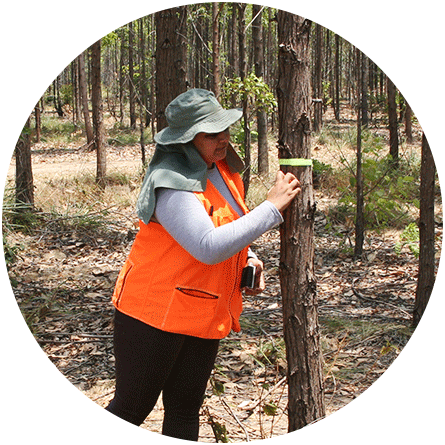Creating value for our industry through research, stakeholder engagements and adherence to international best practices.
This pillar serves as an overarching philosophy for all our pillars and we take a bold approach to continuous learning to do things better and lead the way for others. This pillar also stands on its own as we challenge ourselves to report on how we plan to do things better.
LOOKING FORWARD
Research
Learning requires rigorous research, data gathering, and evidence-based scientific methods. To better understand sustainability benchmarks and impacts specific to our region, and to plantation forestry globally, FFC has reached agreement with two prestigious universities in the UK on a research program to be hosted on FFC’s land holdings. The planned facility would be expanded to invite other higher learning institutions to develop their own programs in this relatively under-researched region. Areas of study will include biodiversity, carbon, soil management, water management, and others as applicable. This facility will be based in Vichada, locally administered, and overseen by a board of directors. An initial site visit was conducted by the cochair of the research project in February of 2023. This visit confirmed the unquestionable value of research in the region.
Continuous Improvement and Reporting
We are proud of the value impacts we have made to date, yet we recognize there is much more to be done. We will continually seek to better define impact measures that meaningfully demonstrate our shared value and develop formalized systems of monitoring and reporting to accurately reflect those measures.
Impact on Poverty Reduction and the Local Economy
A significant percentage of our staff come from the local community, and the employment we provide is crucial to supporting livelihoods in the area. In future reports, we would like to capture specific metrics to reflect the change in employee income over time to better articulate our impact on poverty reduction. To measure our impact on the local economy, we plan to collect additional data from our engagements with local businesses and farmers. This will improve our ability to substantiate how our assistance to these groups improves GDP per capita and agricultural productivity.
Health Care Investment Impacts
FFC’s investments in healthcare infrastructure reflects our commitment to our employees and the surrounding communities. To enhance our performance, we intend to measure the number of people and the number of times people are treated by these facilities, and how much of the local population that represents. We also capture the types of treatment that they are provided. This will contribute to a greater understanding of how our investments are contributing to improving health outcomes in our community. The above metrics will be used to improve the efficiency of our own operations by looking at how these metrics interact with operational metrics, such as the amount of injury time, sick leave, and temporary employment costs.
Education Investment Impacts
Improving the level of education in our community has numerous benefits, including increasing the number of members of the community who are employable. We plan to examine the links between our investments and the educational outcomes at the school as well as the links between education outcomes and other SDGs such as income, employment and inequality. We also want to understand the gender balance of school attendance and employment so that we can work toward further reducing barriers and providing equal access to all.
Local Economic Development Impacts
Stimulating Local Economic Development through Investment in Transformational Infrastructure
We believe our stimulation of local business through local procurement will improve the economic viability of those businesses, and over a longer period, stimulate the wider local economy. We will be engaging those businesses to better assess how our support has benefited them.
Infrastructure Impacts
Feedback from communities is that our efforts in road construction are saving them significant amounts of time. FFC plans to measure how much time is being saved, and how that translates to increased levels of income and productivity.
Water Usage
We know that our water usage and irrigation practices have a positive impact on water-use efficiency, protect and restore water-related ecosystems, improve sustainable withdrawals and supply of freshwater. We are monitoring this, and when we can report on changes in these metrics, these measures will be included in our reporting.
Biodiversity Action
At present there is an increase in forest dwelling species such as antelope, puma and birdlife, moving into FFC’s forestry plantations. Discussions are taking place with the Humboldt Foundation and The Nature Foundation with regards to working with private landowners to create corridors for the movement of jaguars, as the region is a known transit route for these mammals/animals. In addition, there are discussions about creating a wildlife corridor from the Meta River across to the Bita River, which has now been declared a RAMSAR site, to its confluence with the Orinoco River. We are looking to identify a baseline of animals present in the area, with a view to monitor the increase in numbers.
A Commitment to Stakeholder Engagement
As we learn together, we can discover how to do things better – and lead the way for others. To do this requires that we take a bold approach to continuous learning and invite local, national and international partners with a wide range of experience into the conversation. The lessons learnt from these conversations along with our expertise and experiences, will provide us with a clearer roadmap for tracking and measuring shared value impacts in the future. We greatly appreciate the contributions of all the NGOs, educational organizations, and government affiliates that have engaged in dialogue with us, giving us greater insight into biodiversity, wildlife, climate and social perspectives that they specialize in. This allows us to adapt and improve our business practices to ensure a more positive contribution.
RESEARCH CENTRE
As part of our commitment to continuous learning, we are reaching out to a range of local and international partners, including NGO’s, the Colombian government, representatives in the climate community and consultants, to seek guidance, conduct research and implement best practices when it comes to conservation of valuable ecosystems, protection of local biodiversity, propagation of native species and other key areas of sustainable land management. One exciting outcome of these discussions is an agreement with two prestigious UK Universities regarding a research program in the Vichada Region.
The site for the required facility has been identified and engineering and architectural plans are underway.

INTERNATIONAL STANDARDS AND BEST PRACTICES
International Third-Party Forestry Certifications
FFC is certified by FSC® (FSC®-C167272). We are also certified to the Voluntary Carbon Standard (VSC) and the Climate, Community and Biodiversity (CCB) standard through VERRA.
IFC’s Performance Standards
FFC has engaged third party consultants who are assisting us to ensure that all the necessary licenses and permits are obtained with the objective of fulfilling the requirements of the IFC’s Performance Standards. We are one of the few, if not only, forestry companies adhering to these extremely stringent standards.
Climate NGOs
FFC has engaged with a number of climate-related NGOs to ensure we adopt the best practices possible for the region in which we operate.
International Union for Conservation of Nature (IUCN)
FFC cooperated with the IUCN in field testing the application of a global standard for Nature Based Solutions (NBS). We are voluntarily adhering to this new standard.
Environmental and Social Action Plan
Commensurate with the 2017 investment by FinnFund, FFC developed an Environmental and Social Action Plan and instituted a stewardship process with detailed annual reporting against seven key development areas: Compliance with Laws and Regulations; Environmental and Social Competencies and Management; Communication and Training; Human Rights (including equal opportunity employment, gender diversity, and labour rights); Health and Safety; Environment and Climate Change; Anti-Corruption; and Community Development and Society Aspects.
A similar program has been introduced in support of the US International Development Finance Corporation (DFC) debt capitalization of FFC.
Environmental and Social Management System (ESMS)
In addition to the ESAPs from FinnFund and the DFC, an Environmental and Social Management System (ESMS) is being developed in line with the International Finance Corporation’s (IFC) Principles and Standards, with the help of a local Colombian consultancy. FFC is also in the process of finalizing an IFC Compliant Water Management Plan.

